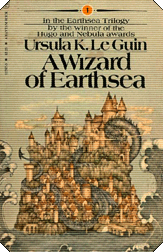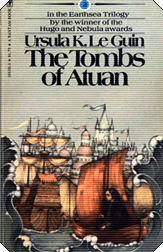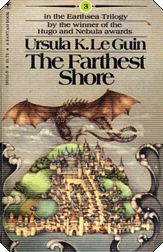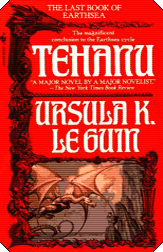The Earthsea Series
by Ursula K. Le Guin
(Click subsequent titles to skip to that part of the review)
Reviewed by Galen Strickland
A Wizard of Earthsea / The Tombs of Atuan / The Farthest Shore / Tehanu
 |
Le Guin formulated some basic rules of magic in two short stories published in 1964. Both "The Word of Unbinding" and "The Rule of Names" appear in her first collection, The Wind's Twelve Quarters. A few years after that, Herman Schein, publisher of Parnassus Press, asked her to write a young adult tale, giving her freedom on the content and style. She decided to use those two stories as her base in developing the world and peoples of Earthsea. That small press was the first venue for A Wizard of Earthsea, but the subsequent titles were released by Atheneum Books. I had previously only read the first one, decades ago, and just finished a re-read of it. Even though I've had copies of the next two for almost as long, I never continued with the series, mainly because, then as well as now, I preferred Le Guin's science fiction to the the fantasy of Wizard. A couple of years ago, after I decided I needed to review all of the Hugo & Nebula award winners, I acquired Tehanu since it won a Nebula. I've already started another book (different author), but I will come back to this series and complete this review as soon as I can.
All of the stories transpire within the vast archipelago of Earthsea. Later tales might venture beyond that, but at least in the first book any knowledge of lands beyond the farthest explored islands is merely rumor or myth. The main character is a young boy, given the name Duny by his dying mother, who lives on the island of Gont. He is later nicknamed Sparrowhawk. His aunt is the village healer, a minor sorceress. Duny learns early that he has some magical abilities, in one instance saving his village from invaders by conjuring a dense fog that hides them from the attackers. He comes to the attention of the wizard Ogion, who apprentices him and bestows upon him his true name, Ged. There is another who wishes to use his gifts for nefarious purposes. In order to impress a young girl, Ged searches Ogion's books for a powerful spell, inadvertently summoning a dark spirit, a shadow, from some other realm. Ogion is able to banish the shadow, but he fears he will be unable to continue as Ged's teacher, instead telling him he should travel to Roke Island to attend the wizard's school for formal training.
Throughout the book it is mentioned that Ged later becomes the most famous wizard of Earthsea, with these tales highlighting his path along that journey. However, this first part mainly points out how arrogant and naive he is, constantly over-stepping his bounds and abilities, jealous of others ranking above him in the school. That mysterious shadow was not completely banished, and during a spell-duel with an older rival, it returns to bedevil Ged. This time the Archmage Nemmerle is able to banish it, but not before it saps his powers, and he dies shortly after. Ged's teachers continually emphasize the need for balance, for the sparing use of the minimum of magic necessary for combating any threat, and not to think of wizardry as a path to accumulating the most power. It's a hard lesson for Ged to learn, but he eventually passes the tests and is granted the helm of wizardry, being assigned to The Ninety Isles. Unfortunately, his shadow nemesis continues to follow him, and at first Ged decides he must flee the peril, but later learns that when he turns to confront it, the shadow is the one to flee. All through the archipelago, utilizing spells to repair and propel a succession of boats, Ged relentlessly pursues the shadow, venturing many miles beyond the farthest island into unknown seas. On the final leg of his journey he is accompanied by Vetch, his closest friend from wizard school, but still must face the dreaded shadow alone in the final encounter.
I won't go into detail about how Ged wins that battle, nor about who or what the shadow really is. Most astute readers should be able to figure it out long before the end. My opinion of this book is not much different now than when I first read it. Le Guin is a master at the poetic turn of phrase, as well as being a very visual story-teller, but after the mastery of her more complex science fiction tales, Earthsea doesn't capture my imagination quite as much. I plan on completing the series in between other books, and I'm hoping my opinion of both the story and of Ged will change, but right now I have to rate the first book as well below the caliber of her SF..
 |
Perhaps magic is real, and wishes do come true. I liked The Tombs of Atuan much more than the first book. Two main reasons for that; the focus this time is on another, more interesting character, but also it seems several years have passed, and when Ged finally does appear he is more mature and thoughtful in his actions. Atuan is an island in a group known as the Kargad Lands, in the northeast section of the Earthsea archipelago. Soldiers of the Kargish Empire were the invaders of Gont that Ged stymied with one of his first displays of magic. Atuan is home to the Tombs of the Nameless Ones, the almost forgotten ancient gods of a bygone era. The settlement that houses the priestesses and servants who guard the tombs is known simply as The Place. Arha is the head of the order, the Priestess Ever Reborn. In the short prologue we meet Tenar, a young girl who had been born on the same night that Arha died. Tenar is decreed to be her latest incarnation, and she is brought to Atuan when she is five, trained to be the next High Priestess.
The Place consists of several sections; dormitories for the priestesses and servants, the Temple of the Godking and the Temple of the God-Brothers, the Hall of the Throne, as well as the Tombstones and the Tomb Wall. A trap door in the Hall of the Throne leads to the Undertomb, reserved for priestesses alone, with the adjacent Labyrinth supposedly accessible only by Arha. She has to become familiar with the labyrinth by touch, since it is in perpetual darkness, although there are times she secretly carries a candle. On one such occasion she sees a unknown person, suspecting a sorcerer who conjured his way into the maze in search of the Great Treasure. There are also spy-holes on the surface, as well as in various rooms above the labyrinth, which she utilizes to keep track of the intruder. When his presence is discovered by one of the priestess-trainers, Arha is expected to have the intruder killed, but instead she wishes to keep him trapped so that she can interrogate him and discover how he gained entrance to the labyrinth. Arha has become close friends with another young priestess, one who is skeptical of the myths of the Nameless Ones. Her own skepticism grows, and she allows Ged to convince her to escape the labyrinth with him, now that he has found the second half of the broken Ring of Erreth-Akbe.
Anytime there is a fictional religion or cult, the author has the choice to depict it reverently or skeptically. Le Guin does both here, with Tenar and the older priestesses training her portrayed as true acolytes, while others, including the Godking, couldn't care less for the rituals. Nothing about the Nameless Ones makes much sense, but if I didn't misinterpret things toward the end, they are depicted as entities that retain real power. Either that or Tenar/Arha couldn't interpret certain events any other way. I've already mentioned several times, here and in other reviews, how Le Guin is superb at painting a picture in the reader's mind of the characters, places and action. I had no problem visualizing the dark labyrinth since Arha's movements, her counting of doorways and branching tunnels, and remembrance of the many twists and turns, is very detailed. Another plus is Le Guin didn't fall into the trope of a romantic relationship between Ged and Tenar/Arha. I've never seen the Sci-Fi Channel miniseries, mainly because Le Guin disavowed it, but from what I've heard they went that direction on the show. At least they cast Ogion (Danny Glover) correctly, but Ged should have been played by a black actor as well. I don't recall reading or hearing about where the story goes in the next book, The Farthest Shore, but due to the strength of this second one I'm looking forward to it a lot more than I had anticipated. However, I'll put that off for a bit since I'll be reading a lot of Hugo nominees for a while yet..
 |
There's a lot to like about The Farthest Shore, the "concluding" book of the trilogy, but also a few negatives. I liked that we see Sparrowhawk/Ged as a mature man, now the Archmage of the Roke Isle school of wizardry, yet all three books are short, so we don't get as much of his story as I would have liked. In the first book, he was brash and impetuous, although he did learn from some of his mistakes. The second book showed him just a few years later, but more poised and sure of himself. I would have liked to read more of his adventures, to understand how he comes to be the wise old mage here, especially because from the very beginning we were told that was to be his fate. Only a couple of those stories are hinted at, but Le Guin left much to the reader's imagination.
Oddly enough, Ged isn't the focal character. That would be Arren, a prince from the northern isle of Enlad, who journeys to Roke to seek guidance from the wizards. The sorcerers of Enlad have lost their skill at magic, and many of the people, as well as livestock and crops, suffer from sicknesses and lethargy. Ged has heard similar stories about some of the southern isles, and he encourages Arren to travel with him to seek out the cause. As I said earlier, the trilogy is short in comparison to many current book series, and yet this third volume could have been shorter still. Several scenarios weren't connected to the main mystery; Arren being kidnapped by pirates, later to be rescued by Ged; a sojourn with a sea-faring group (whom Ged had never heard of) in the far south. Why didn't the dragon Orm Embar come to Ged earlier on Roke to inform him of the answer to his quest, rather than having to track him down in the far south seas?
Throughout the book, Arren is puzzled why Ged refrains from using magic. It also frustrates him that Ged speaks very little. He mainly observes Arren, and when he does talk it is to give him subtle hints and encouragements, expecting Arren to lead the way. It is clear that Ged sees more in Arren than the lad does himself, and his confidence is later rewarded. In fact, without Arren, it is very likely Ged would have been defeated by the menace that threatens all of Earthsea. The ultimate battle is anti-climactic, and while no reader should have expected the forces of evil to prevail, I do wish I had felt more peril for the heroes. In the first paragraph of this section I put the word "concluding" in quotes for two reasons. This book ends abruptly, not detailing the later life of Arren when he was crowned King on Havnor and sat on the ancient throne of Erreth-Akbe, and the concluding years of Ged's life are hinted at with just a few sentences. The other reason is that Le Guin eventually returned to this world eighteen years later, with Tehanu. I've just started it, so I don't know if she writes any more of Ged or Arren..
 |
Tehanu won a Nebula as the best novel of 1990. At that time it was subtitled The Last Book of Earthsea. Eleven years later that subtitle would have to be removed from subsequent reprints, since another novel, as well as a story collection, were published in 2001. I don't have either of those yet, so at this time I'll say that Tehanu is the best of the series I've read so far. The main reason for that is the return of my favorite character from the second book, Tenar, although at this time she goes by the name of Goha. Even though eighteen years had passed in the real world, the events in this novel actually overlap the end of The Farthest Shore.
After Ged and Tenar escaped the Tombs of Atuan, they traveled west, first to the main island Havnor, later to Ged's home island of Gont. Tenar was left with Ged's old teacher Ogion, while he returned to Roke, later to be named Archmage. Tenar studied with Ogion for only a little while, deciding she had no interest in learning the ancient language of the dragons, which is the basis of the most powerful magic. She married and had children, worked hard on their farm until her children were grown and moved away, and lost her husband to a stroke. Shortly after becoming a widow, she adopted Therru, a girl who had been brutally abused by her family, left for dead after severe burns from a fire. Later, word comes to her that Ogion is ailing, and she travels with Therru to see him, hoping to arrive before his passing.
Several times throughout this series, both Ogion and Ged stated that in most situations it was best to refrain from magic, relying on it only as a last resort. Le Guin does the same here with the narrative, concentrating on character development rather than magic to move the plot, as well as some pointed commentary against the patriarchal society of Earthsea. Tenar/Goha is as good a representative of the nurturing mother as I've ever read. She's kind, loving, loyal, encouraging, especially in the way she treats Therru. Perhaps not as physically strong as she would like at times, but never weak psychologically. Except...the few times magic is revealed, it's not the benevolent sort Ged would exhibit, but rather a malevolent curse placed on her by an acolyte of the evil force Ged thought he had eliminated in the previous book. But those revelations come toward the end, it's the earlier exploration of Tenar's character than propels this book. Ged does figure into parts of the narrative, but again he's not the main focus.
I'm not going into any more detail than that. I recommend this book unreservedly. However, I do want to say something about my previous comments regarding fantasy, basically that I don't like it as much as science fiction. At least with the more realistic hard-SF, the science presented is more believable. Yes, suspension of disbelief is necessary at times, but with fantasy, it's all unreal, completely fabricated. There really is no way to suspend disbelief of magic, dragons, wizards, sorcerers. And yet...throughout this series I have come to a different opinion. Perhaps fantasists are presenting magic in a way that makes complete sense. Words Have Power. The right words, spoken at the right time, can create a more positive result, just as the wrong words can create negative energy, chaos, and destruction. Witness recent political speeches. In that sense, fantasy is just as valuable a tool for writers than any other form of literature. Le Guin knows this, and uses words to perfection. This is her art.
The later novel mentioned above is The Other Wind. I don't have it, but if I do read it in the future I will return to this page and talk about it.
Would you like to contribute an article on your favorite SF, Fantasy or Horror book?
Just email me.
We would appreciate your support for this site with your purchases from
Amazon.com and ReAnimusPress.